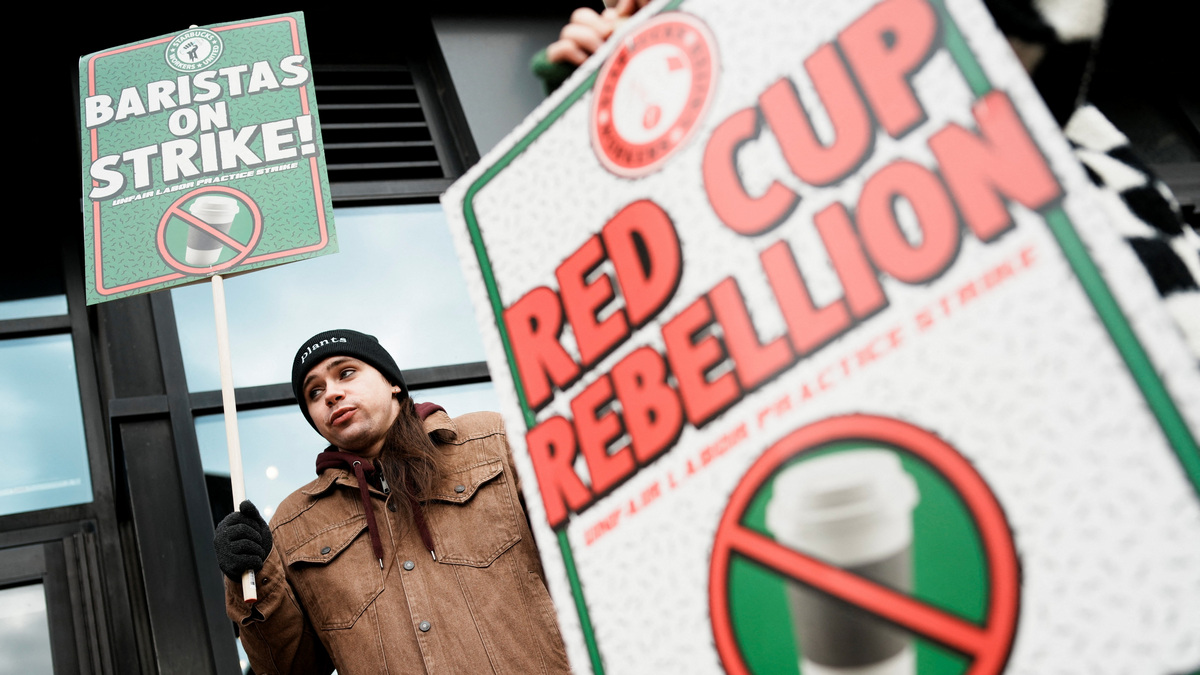Craving your daily cup of coffee? If you’re in the United States, don’t go to Starbucks.
Over 1,000 employees of the coffee chain are going on strike across dozens of cities in America. The development comes in the backdrop of Red Cup Day, an event Starbucks puts on every year in which it distributes free, reusable red cups.
For Starbucks, this is usually one of the biggest and busiest sales days. For employees, this is an opening salvo against an employer in which it has long complained about when it comes to staffing, benefits and better pay.
But what happened? What do we know?
Let’s take a closer look
What happened?
The strike will take place today (November 13) at 65 locations in 40 cities. The open-ended strike, which some have called the ‘Red Cup Day Rebellion’, comes after the employees union, Starbucks Workers United, gave the go ahead. The striking employees, who have joined the union, are pursuing their first ever labour contract with the coffee giant.
Starbucks has around 10,000 stores in the US as well as around 7,000 licensed locations at grocery stores and airports. However, just a fraction of these stores, around 550, and their employees have voted to unionise. The union has that 92 per cent of its members have voted to go ahead with the strike. Those who go on strike say they will picket outside the stores.
The union plans to rally at 4 pm local time in more than a dozen cities and warned the strike could become the largest and longest in the history of Starbucks. Stores in cities, including Seattle, New York, Philadelphia, Dallas, Austin and Portland, will join the work stoppage, it said.
“We’re striking for a fair union contract, resolution of unfair labor practices and a better future at Starbucks,” said Dachi Spoltore, a Starbucks barista from Pittsburgh who joined the strike. They have also sought support from those who patronise Starbucks regularly.
“For every one barista on strike, dozens more allies and customers have pledged to honor the picket line and not buy Starbucks while we’re on strike.”
Quick Reads
View AllIt’s more than just about wages. The union has filed over 1,000 complaints against Starbucks for unfair labor practices to the National Labor Relations Board. It says understaffing at Starbucks stores and rampant and that Starbucks is “biggest violator of labor law in modern history.”
Starbucks hits back
Starbucks has hit back. It says it offers pay equivalent to $30 (Rs 2661) per hour. The average minimum wage in the United States is at $7.50 (Rs 655) per hour.
Starbucks CEO Brian Niccol last month told “CBS Mornings” it has “the best benefits” and “the best wages” in the industry.
“What their requests to date have been, has been unreasonable,” Niccol said. “We’re willing to, you know, negotiate and have ’em come back to the table and find a solution.”
It has also claimed that it receives, on average, over a million applications per year. “The facts show people like working at Starbucks,” Jaci Anderson, Starbucks director of global communications, told Forbes.
However, the union members point out that many workers don’t even meet the minimum of 20 hours per week needed to qualify for benefits. The union has vowed to escalate the matter if Starbucks refuses to “resolve unfair labor practice charges.”
“If Starbucks keeps stonewalling a fair contract and refusing to end union-busting, they’ll see their business grind to a halt,” Michelle Eisen, Starbucks Workers United spokesperson and 15-year barista was quoted as saying. “No contract, no coffee is more than a tagline—it’s a pledge to interrupt Starbucks operations and profits until a fair union contract and an end to unfair labor practices are won.”
The strike comes as Niccol has shuts hundreds of underperforming stores, including the unionised flagship Seattle location, this year while trimming corporate roles to control costs. Niccol has stressed on improving service times and in-store experience in the US to revive demand for beverages as sales remain flat or negative for the past seven quarters.
The union in April had voted to reject a Starbucks proposal that guaranteed annual raises of at least two per cent, which the union said did not offer changes to economic benefits such as healthcare, or an immediate pay hike. In 2024, talks between the union and Starbucks broke down, after which workers went on strike during the key holiday period in December.
Both sides had then blamed each other for ending talks, but said they are ready to return to negotiations. This would be the third such strike by Starbucks employees over the past year.
Starbucks has remained unmoved. The chain has said it has witnessed minimal impact from the walkouts with less than 1 per cent of its stores seeing any level of disruption. It says it is focusing on its Red Cup Day. Starbucks in a press release said that it is looking to give away “more cups than ever before.”
“Red Cup Day is a beloved tradition for Starbucks customers,” it said. “This year, we’re giving away more cups than ever before. We’ll also have more baristas in our cafés to welcome customers and ensure a great experience for everyone. This is all part of providing the very best Green Apron Service and celebrating the holidays with our customers.”
With input from agencies
)